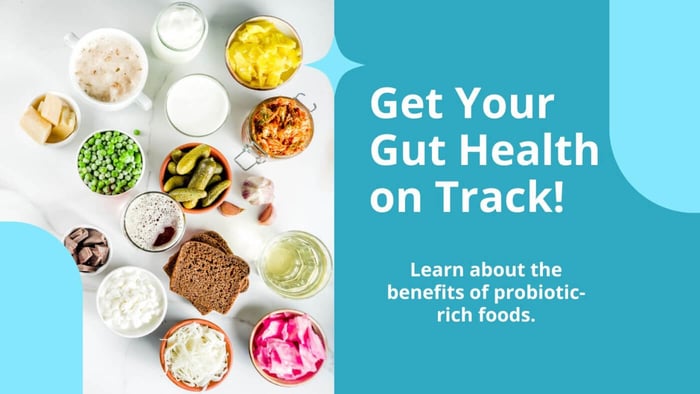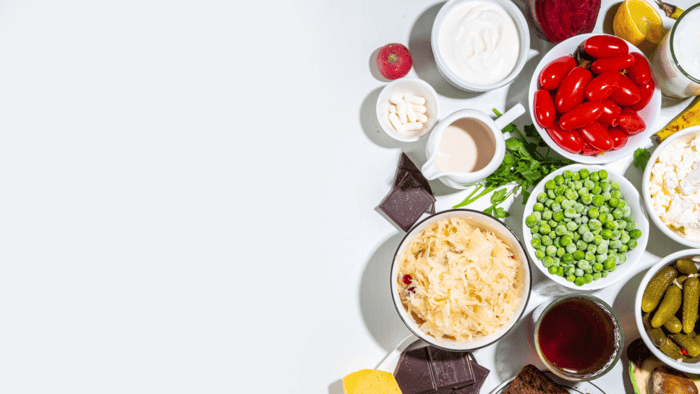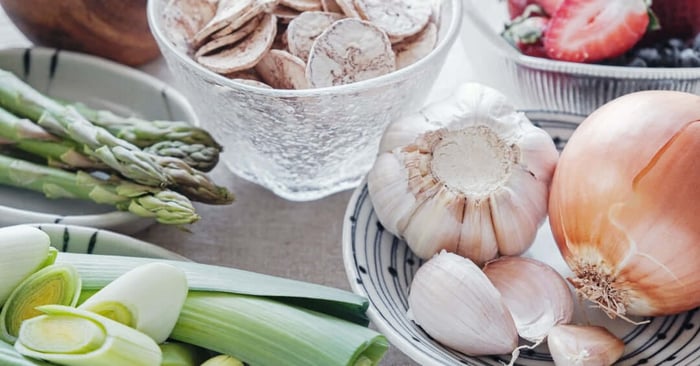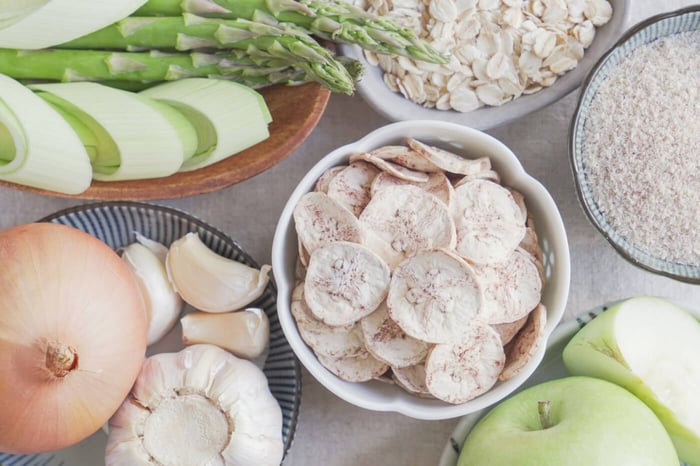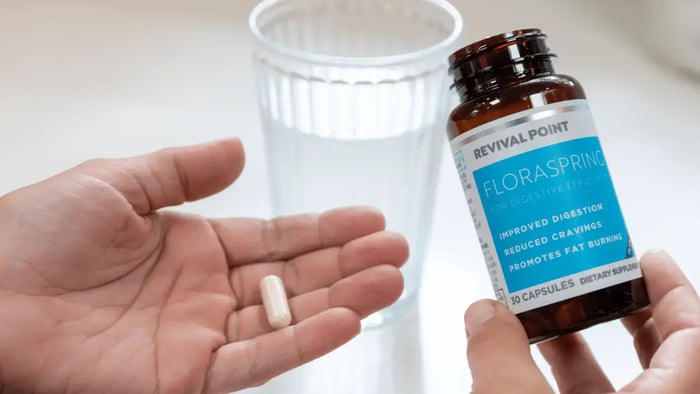Introducing foods with probiotics into your diet is an excellent idea. If you already have gut issues, this can help you to balance out the good and bad bacteria in your system, easing symptoms and preventing you from going onto probiotic supplements.
Even if you don’t have gut problems, including these foods can help to keep your gut microbiome healthy and balanced. This is the best way to ensure that your digestive system stays healthy over the long term!
So let’s get into the importance of probiotics and why you should be eating these easy-to-buy foods in your daily life!
What Are Probiotics?
Probiotics are live bacteria in your digestive system. Yes, that sounds creepy, but probiotic bacteria are the soldiers responsible for keeping your gut microbiome—your stomach and intestine environment—healthy and happy.
Why Do You Need Them?
These good bacteria in your system perform a few vital roles in the body. One, they fight bad bacteria that can cause stomach upset. Two, they help your body to absorb nutrients more readily so your body gets what it truly needs from food. This has a knock-on effect to your metabolism, speeding it up!
There are some great side effects as well. For example, did you know that upwards of 90% of serotonin—the “happy hormone” is produced in the gut? Yes! That means these good bacteria in your stomach are actually also partially responsible for keeping you mentally sound and happy.
In addition to that, when your gut health is good, your immune system works better. This means not only better digestive health but better health overall! Oh, and did we mention… The better your gut health, the easier weight loss becomes?
The Best Synbiotic Combo: Click Here Now to Check It Out
Signs You Need More Probiotics
Is your gut rebelling against you? Are you suffering with digestive issues? The problem may be a lack of good bacteria in your gut. Here’s what you may experience when your probiotic balance is skewed.
- Bloating
- Excess gassiness
- Abdominal pain
- Changes in your stool
- Brain fog
- Unusual tiredness
- Mood swings
As you can see, the symptoms of unbalanced gut bacteria extend past the gut too!
How Do You Get More Probiotics?

There are two ways to get more probiotics in your diet. One, eat many probiotic-rich foods on a daily basis. Two, take a probiotic supplement.
Keeping your diet as natural as possible is always first prize. If you can balance your gut microbiome by just including some of these foods, then you may never need to take at tablet to smooth out your gut health.
Foods With Probiotics
Plenty of foods are natural sources of probiotics. But not all of them contain enough probiotics to be worth eating on a regular basis. These foods (and drinks) are easy to add into your daily diet, tasty enough to not feel like “diet” foods, and easy to access.
Yogurt
Yogurt is easy to add into your diet! You can eat it as is, add some fruit and honey, or even add it to sauces or bake with it.
Most yogurt (unless it’s exceptionally processed) contains probiotics. You can also find probiotic yogurt, which has been carefully formulated to contain live and active cultures that your gut needs.
Interestingly, those with lactose intolerance can benefit highly from probiotic yogurt. It’s quite easy to digest and adds plenty of good bacteria to your system!
Cottage Cheese
Cottage cheese is a great probiotic food that adds a dash of protein and is also quite versatile. You can get quite creative with it! Eat it with crackers, pair it with fruit, add it to a salad, put it in a smoothie, or substitute it for milk when baking. Perfect with sweet and savory!
Brand New: The Best (Doctor-Recommended) Probiotic on the Market
Just be aware that not all cottage cheese products contain probiotics. It’s a good idea to find one that specifically states on the packaging that it’s high in probiotics.
Sauerkraut
Fermented foods are high in probiotics! Sauerkraut—fermented cabbage—is perhaps the most common fermented dish in the Western world, and it’s great for your digestive system.
You can eat it as a snack on its own, or as a side dish with another meal. And one of the best things about fermented foods is that you can make them yourself at home!
Miso
Miso is a fermented paste that’s often used in salads and soups to give it some flavor. It’s savory, salty, and with a bit of a bite!
Make miso soup, toss it into salad, or add it to marinades. There’s no need to use a lot of it, as it’s quite strong.
But adding this simple ingredient to your daily diet can make a difference, as research shows it contains a good amount of probiotics bacteria!

Pickled Foods
Pickled foods are easy to make and can pack a probiotic punch! As long as they’re pickled in saltwater brine rather than vinegar. Vinegar stops the growth of probiotic microorganisms, but saltwater brine encourages it!
You can pickle almost anything at home. Which makes this an excellent choice. Not only does is it easy to make, but pickled foods stay preserved for ages.
Kombucha
Kombucha has become popular in recent years. It’s a drink rather than a food, but it counts towards your gut health! It’s basically fermented black tea, with a slight fizz to it, which contains live and active cultures that can help to balance out your gut microbiome.
Probiotic Supplements
If you still aren’t getting enough probiotics in your food, you may consider going onto a probiotic supplement. It’s wise to check with your doctor first, but you can usually get probiotics over the counter.
But who really wants to be taking a pill everyday if they don’t have to? We highly recommend trying to fill your diet with these foods with probiotics before considering a supplement. If you find it impossible to stick to or your gut issues don’t improve, probiotic supplements are the logical next step.
Keep in mind that you need to try this probiotic-rich diet for at least 2 to 3 months before you start seeing the benefits! Be patient… It may just be the best thing for you.
Final Thoughts
This list is by no means an exhaustive one! Tons of foods out there contain minute amounts of probiotics. The key is to maintain a healthy diet, but if you do need to add more probiotics to your diet, you now know which foods to focus on.
We advise first trying to balance your gut health by optimizing your diet. If you see no results after 2 or 3 months of eating more foods with probiotics, then a probiotic supplement would be the obvious next choice.

